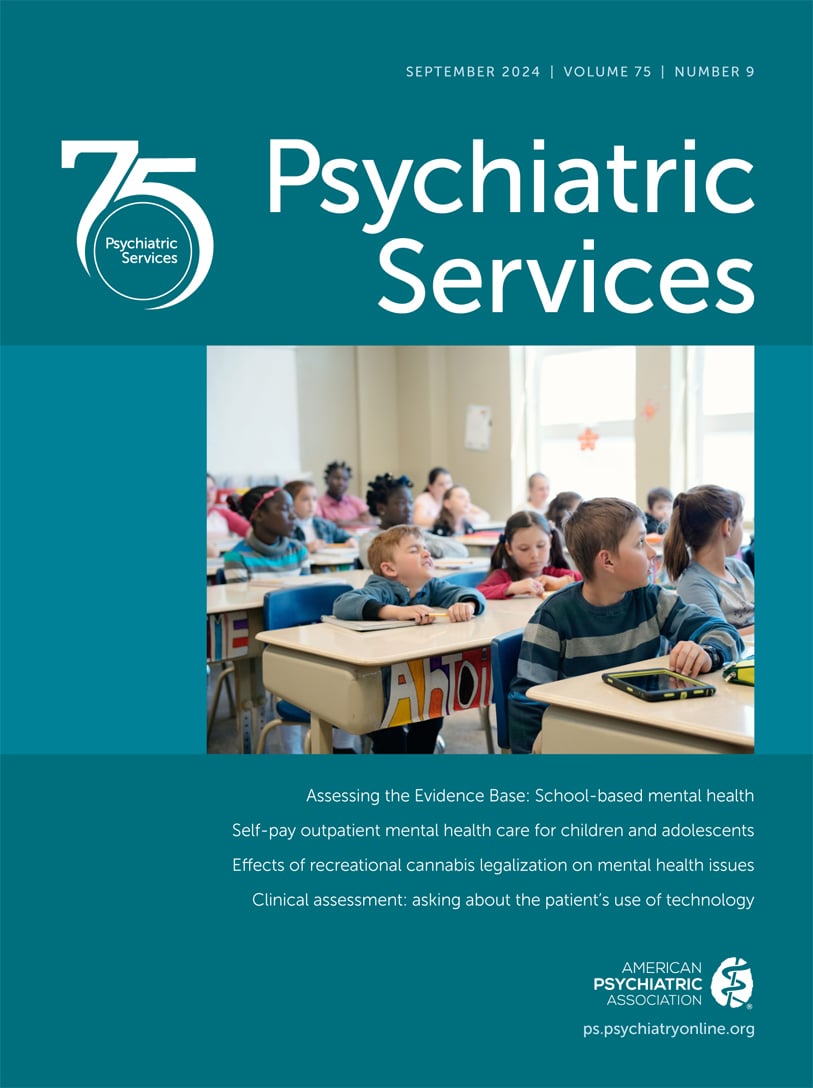Psychiatric Services
- Volume 69
- Number 7
- July 2018
Taking Issue
Reviews & Overviews
Publication date: 16 April 2018
Pages751–759Objective: Access to mental health care is regarded as a central suicide prevention strategy. This is the first systematic review and meta-analysis of the prevalence of contact with mental health services preceding suicide. Methods: A systematic search for ...
https://doi.org/10.1176/appi.ps.201700475Articles
Publication date: 16 April 2018
Pages760–767Objective: This article presents findings from a randomized controlled trial of a peer support mentorship intervention designed for individuals with serious mental illness and frequent, recurrent psychiatric hospitalizations. Methods: Seventy-six individuals ...
https://doi.org/10.1176/appi.ps.201600478Publication date: 16 April 2018
Pages768–776Objective: This study examined factors related to retention in buprenorphine treatment for opioid use disorder (OUD) among privately insured patients. Methods: Patients with OUD who were newly started on buprenorphine during federal fiscal year (FY) 2011 ...
https://doi.org/10.1176/appi.ps.201700363Publication date: 02 April 2018
Pages777–783Objective: Violent and aggressive behaviors are common among psychiatric inpatients. Hospital security officers are sometimes used to address such behaviors. Research on the role of security in inpatient units is scant. This study examined when security is ...
https://doi.org/10.1176/appi.ps.201700546Publication date: 02 May 2018
Pages784–790Objective: Multiple studies demonstrate a consistent pattern of improvement on quality measures among health care organizations after they begin collecting and reporting data. This study compared results on psychiatric performance measures among cohorts of ...
https://doi.org/10.1176/appi.ps.201700468Publication date: 26 April 2018
Pages791–796Objective: Community treatment orders (CTOs) refer to a variety of legal schemes that require a person with a serious mental illness to follow a plan of treatment and supervision while living in the community. Use of CTOs has been controversial, and they ...
https://doi.org/10.1176/appi.ps.201700492Publication date: 26 April 2018
Pages797–803Objective: The relationship between inpatient volume and the quality of mental health care remains unclear. This study examined the association between inpatient volume in psychiatric hospital wards and quality of mental health care among patients with ...
https://doi.org/10.1176/appi.ps.201700426Publication date: 26 April 2018
Pages804–811Objective: This study examined whether having co-occurring substance use and mental disorders influenced treatment engagement or continuity of care and whether offering financial incentives, client-specific electronic reminders, or a combination to ...
https://doi.org/10.1176/appi.ps.201700465Publication date: 02 May 2018
Pages812–818Objective: This study examined job endings and work trajectories among participants in a study comparing the effects of adding cognitive remediation to supported employment among individuals who had not benefited from supported employment. Methods: Data were ...
https://doi.org/10.1176/appi.ps.201700489Publication date: 15 May 2018
Pages819–825Objective: In self-direction, participants control individual budgets, allocating service dollars according to needs and preferences within program parameters to meet self-defined recovery goals. Mental health self-direction is associated with enhanced ...
https://doi.org/10.1176/appi.ps.201700057Open Forum
Publication date: 02 April 2018
Pages826–828A 2016 report from the National Academy of Sciences describes strategies that reduce the stigma of mental illness. Prominent among these are contact between people with and without mental illness and strategic disclosure for lessening both public and self-...
https://doi.org/10.1176/appi.ps.201700478Publication date: 16 April 2018
Pages829–831People with serious mental illness are more likely to be arrested multiple times for the same crime, spend more time in jail before adjudication, serve longer sentences, and have higher recidivism rates than those without mental illness. Several ...
https://doi.org/10.1176/appi.ps.201700420Global Mental Health Reforms
Publication date: 15 March 2018
Pages738–740The recognition of mental health needs in developing countries is growing in parallel with increased public awareness of and reduced stigma toward mental illness. With resources still limited in these countries, creating economically viable health care ...
https://doi.org/10.1176/appi.ps.201800018Technology in Mental Health
Publication date: 15 March 2018
Pages741–743Although underdeveloped in mental health care, the sub-Saharan country of Ghana is advanced in telecommunications. In this context, innovative mobile health (mHealth) approaches may help to overcome limited infrastructure (lack of clinics, trained ...
https://doi.org/10.1176/appi.ps.201700555Promoting High-Value Mental Health Care
Publication date: 16 April 2018
Pages744–747This column reviews the unique contributions of multiple partners in establishing a standardized site visit process to promote quality improvement in mental health care at the Veterans Health Administration. Working as a team, leaders in policy and ...
https://doi.org/10.1176/appi.ps.201700534Law & Psychiatry
Publication date: 25 May 2018
Pages748–750People with mental illness are often disproportionately affected by the U.S. justice system, yet psychiatrists and other mental health professionals may avoid or feel uncomfortable talking with patients about legal history. This column examines why legal ...
https://doi.org/10.1176/appi.ps.201800183Brief Reports
Publication date: 08 May 2018
Pages832–835Objective: This study examined buprenorphine prescription uptake and expenditure trends among privately insured adults from 2003 to 2015 to inform efforts to expand opioid use disorder treatment. Methods: A study with a repeated cross-sectional design using ...
https://doi.org/10.1176/appi.ps.201700315Correction
Letters
Past Issues
View Issues Archive
Vol. 75 | No. 12

Vol. 75 | No. 11

Vol. 75 | No. 10
